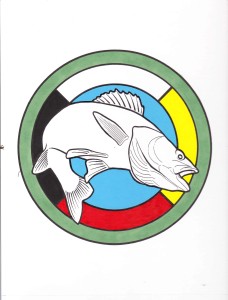Activities
 As part of the community engagement strategy for the Project, a logo contest was initiated in each of the four regions.Ìý The project logo will be based on a circular medicine wheel with each of the four partner regions being represented in one quarter of the logo.
As part of the community engagement strategy for the Project, a logo contest was initiated in each of the four regions.Ìý The project logo will be based on a circular medicine wheel with each of the four partner regions being represented in one quarter of the logo.
The Ontario region design highlights the Walleye, a primary fish species in the region set against traditional colours and medicine wheel graphic.
Ìý
—â¶Ä”â¶Ä”â¶Ä”â¶Ä”â¶Ä”â¶Ä”â¶Ä”â¶Ä”â¶Ä”â¶Ä”â¶Ä”â¶Ä”â¶Ä”â¶Ä”â¶Ä”â¶Ä”â¶Ä”â¶Ä”â¶Ä”â¶Ä”â¶Ä”â¶Ä”â¶Ä”â¶Ä”â¶Ä”â¶Ä”â¶Ä”â¶Ä”â¶Ä”â¶Ä”â¶Ä”â¶Ä”â¶Ä”â¶Ä”â¶Ä”â¶Ä”â¶Ä”â¶Ä”â¶Ä”â¶Ä”â¶Ä”â¶Ä”â¶Ä”â¶Ä”â¶Ä”â¶Ä”â¶Ä”â¶Ä”â¶Ä”â¶Ä”â¶Ä”â¶Ä”â¶Ä”â¶Ä”â¶Ä”â¶Ä”â¶Ä”â¶Ä”â¶Ä”-
Stories from the Land Workshop
A Nipissing Youth and Elders Fisheries and Traditional Knowledge Project
Nipissing First Nation
Wednesday November 4thÌý– Sunday November 8thÌý2015
Workshop Facilitator
Ryan McMahon, Anishnaabe/Metis comedian
Youth Empowerment, Leadership and Cultural workshop facilitator
Co-Facilitators
Lisa Blenkinsop, Master’s student, University of Guelph, Fish-WIKS
Clint Couchie, Natural Resources Manager, Nipissing First Nation, Fish-WIKS community liaison
Purpose of the Project
Explore the meaning and importance of Indigenous Knowledge and Fisheries Knowledge to Youth and Elders within the Nipissing First Nation through land based storytelling, digital media/podcasting & Traditional Knowledge transfer and teachings.
This project is part of a larger project known as Fish-WIKS (‘Fisheries – Western and Indigenous Knowledge System’), a national research project that seeks to improve fisheries governance and management in Canada by understanding if and how Indigenous knowledge systems can enhance fisheries governance in Canada.
Workshop Participants
Nipissing First Nation Youth (14-29) and Elders (50+)
Workshop Goals
Through community research, interviews and through the sharing of Traditional Knowledge in sharing circle form, the Stories From The Land project will inform the Nipissing FN, the general population & the project partners of how Anishinaabe Peoples governed themselves through land use, their connection to land, water, plants & animals and how this can/will inform use policies of today.
AÌýkey goal of this projectÌýis to create space for storytelling & knowledge transfer to happen in a way that empowers the community and the project participants. Indigenous Knowledge systems and law lives through stories, our histories are sustained through stories and our daily lives can be guided by these stories/systems. Without the space for storytelling, what happens to these stories/histories/laws?
Other goals and objectives:
1.ÌýÌýÌýÌý Identify successful Elder-Youth relationships and engagement happening within the community.
2.ÌýÌýÌýÌý Identify Elders seeking Youth and Youth seeking Elders for intergenerational knowledge sharing.
3.ÌýÌýÌýÌý Explore gaps and barriers in connecting Youth and Elders.
4.ÌýÌýÌýÌý Identify opportunities for Youth to access meaningful engagement with Elders and ways to make Elders more accessible to Youth.
5.ÌýÌýÌýÌý Bring Youth and Elders together to create space and place for intergenerational engagement.
6.ÌýÌýÌýÌý Provide Nipissing First Nation with information on community/traditional knowledge. This can be used to inform Fisheries decisions as well as create opportunities/programming to maintain and expand knowledge within the community.
Contribution to Fish-WIKS research
The workshop directly relates to Lisa Blenkinsop’s research objectives; recorded data and observations from the workshop will contribute to Lisa’s Master’s research and thesis.
Tools & Process
A number of different approaches will be taken to gather the stories & the histories of the connection between Nipissing FN and their fisheries practice.
Audio interviews/podcasting will be used as a tool to archive the stories, interviews and teachings for future use. Ryan McMahon, Nipissing FN Youth and Elders will conduct the interviews.
Sharing Circles
Circles will allow participants to introduce themselves to each other and identify the goals of the project.
Interviews
Youth and the Elders will have a chance to sit and chat, one on one, to learn from each other’s knowledge base.
Findings
A closing circle will conclude the process of the sharing circles and interviews. General findings will be shared and the table will be set for a day of action planning with the Youth and the Elders.
Action Planning
A session of brainstorming and planning on how Youth & Elders can better support Nipissing FN Fisheries and continue to share the stories, histories and laws of the community in partnership and in perpetuity.
ÌýDissemination of Findings to the Community
Community Presentation
A short community presentation will be put together by the Youth & Elders to give the findings back to the community. This will be done in the evening through the sharing of live stories, disseminating of audio interviews and the presentation of the processes findings and the action plan moving forward.
Audio Archives
The audio archives (interviews, community documentary) will be sent to the community leadership, Nipissing FN Fisheries Department and the community at large by making the audio files available on a website hosted by the community.
Digital Podcast
A feature historical/documentary presentation on the Nipissing FN’s history in the area, the fishery and other localized Traditional knowledge will be produced by Ryan McMahon, to be presented back to the community and shared online.
Research Findings
Lisa Blenkinsop’s research findings will be presented to the community following the completion of her Master’s thesis.
